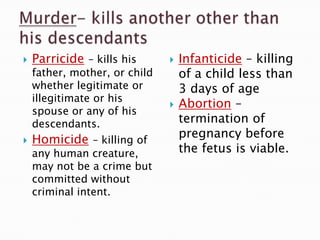Selected nursing legal responsibilities
- 2. ’üĮ An act committed in violation of public (criminal) law ’üĮ Punishable by a fine or imprisonment ’üĮ Does not have to be intended in order to be a crime >Example: accidentally administering an additional and lethal dose of a narcotic to relieve discomfort
- 3. ’üĮ Felony ŌŚ” Serious nature (e.g., murder) ŌŚ” Punishable by term in prison ’üĮ Misdemeanor ŌŚ” Less serious ŌŚ” Punishable by a fine or short-term jail sentence, or both (e.g., using expired license)
- 4. ’üĮ A nurse who administers an additional and lethal dose of a narcotic may be charged with second-degree murder or manslaughter ’üĮ A nurse who slaps a clientŌĆÖs face could be charged with a misdemeanor
- 5. ’üĮ Civil wrong doing against a person or a personŌĆÖs property ’üĮ Based on fault ŌŚ” Something done incorrectly ŌŚ” Something omitted
- 6. Intentional ’üĮ Act done on purpose or with intent ’üĮ No harm need be caused Unintentional ’üĮ Negligence, malpractice ’üĮ Do not require intent ’üĮ Require element of harm
- 7. Assault - Attempt or threat to touch unjustifiably Battery- Willful touching that may or may not cause harm False imprisonment- Unjustifiable detention without legal warrant Invasion of privacy- Direct wrong doing of a personal nature
- 8. ŌĆó Communications that are false Slander Defamation by spoken word Libel Defamation by means of print, writing, or pictures
- 9. Negligence ’üĮ Misconduct or practice that is below the standard expected of an ordinary, reasonable, and prudent person ’üĮ Places another person at risk for harm ’üĮ Applies to anyone ŌŚ” Example : giving medication without reviewing the 10 rights; long duration on application of hot water bag which caused burn.
- 10. Malpractice ’üĮ Negligence that occurred while the person was performing as a professional ŌŚ” Applies to physicians, dentists, lawyers, and generally includes nurses ’üĮ Ex. A nurse prescribing medication to patient. ’üĮ Giving over dose pain reliever because of sympathy.
- 11. Elements of Malpractice Duty Breach of duty Forseea- bility Causation Harm or injury Damages
- 12. ’üĮ Does an act or fails to do an act that causes damage. ’üĮ Example : A nurse knows the patient needs to be given Oxygen but the nurse did not administer the oxygen. ’üĮ A medicine is supposed to be administered by 8:00 am but the nurse prioritized to have break first before giving the meds.
- 13. ’üĮ Parricide ŌĆō kills his father, mother, or child whether legitimate or illegitimate or his spouse or any of his descendants. ’üĮ Homicide ŌĆō killing of any human creature, may not be a crime but committed without criminal intent. ’üĮ Infanticide ŌĆō killing of a child less than 3 days of age ’üĮ Abortion ŌĆō termination of pregnancy before the fetus is viable.
- 14. ’üĮ Simulation of Birth ’üĮ - substitution of one child for another or conceal/abandon any legitimate child with intent to cause child to lose his/her civil status. ’üĮ Extorting ransom ’üĮ - demanding / forcing the payment of money from a person, through violence/ intimidation, as the price for the delivery or release of a detained or kidnapped victim.














